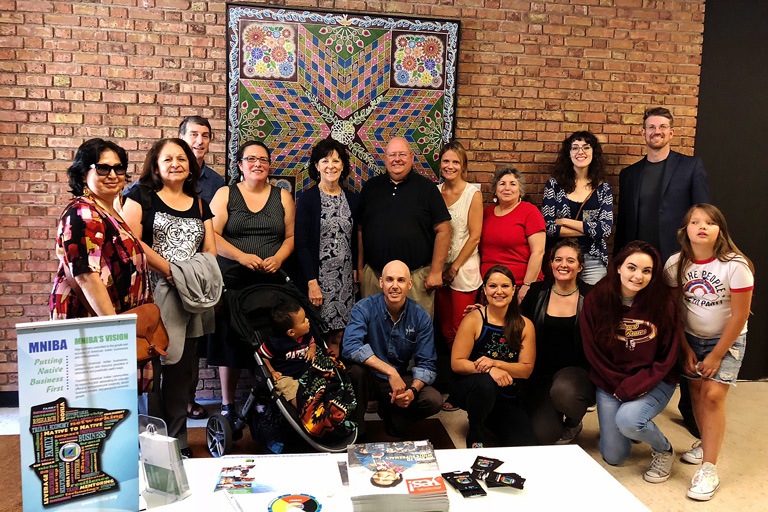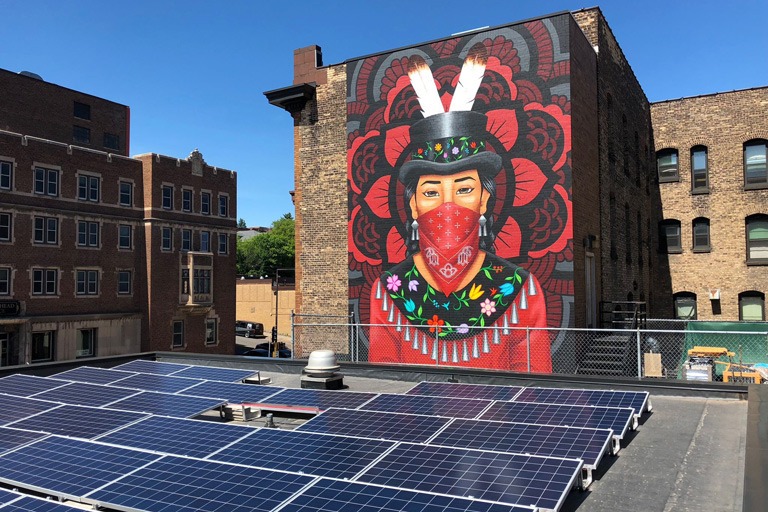Minnesota Indigenous Business Alliance

Photo credit: Minnesota Indigenous Business Alliance
Propel Nonprofits’ fiscal sponsorship model delivers resources to organizations such as the Minnesota Indigenous Business Alliance, a largely rural, mission-based network working with flexibility and a lean central leadership structure made possible by Propel Nonprofits’ range of services.
“We’re looking at what our healthy economy would look like, with best practices in Indian Country for all our communities and their members – and with someone who looks like them doing the work.”
Pamela Standing, Project Director, Minnesota Indigenous Business Alliance
Minnesota is home to nearly 60,000 Native Americans spread across rural tribal pockets that have historically seen limited economic development. The establishment of successful casinos on tribal lands, while generating revenue, hasn’t spurred the kind of small-business creativity to fully tap the potential of a people known for resourcefulness, creativity, and perseverance. This started to change in 2006, when representatives from Minnesota attended a conference at the Montana Indian Business Alliance – an organization promoting Native entrepreneurship through partnerships and collaboration between Native business people, along with fiscal resources, training, and services to get business ideas off the ground and into sustainability. Organizers put out feelers to see if this idea could take root in Minnesota.
A Growing Network
By 2008, the Alliance formally came into being with a mission focused on respectful reciprocity and the development of organic business relationships through quarterly meetings oriented around small-business development. Today the Alliance counts approximately 135 members across a wide palette of industries and services.
“We got all of that early work accomplished without having any money. It was all volunteer,” says Alliance project director Pamela Standing. With a grant in 2010, the Alliance outlined a formal strategic plan and began to develop resources in the form of connections and information, with a major motivator provided by a study by the Bois Forte Band of Chippewa detailing the magnitude of capital that left the reservation without being invested in that community.
“Our resources are cultural and meet people where they’re at,” says Standing. “There isn’t one single curricula – you don’t build a house with just a hammer. Different communities have different needs, and what’s going to work is being really sensitive to what a community is looking for. We’re like a matchmaker, finding resources for entrepreneurs looking for funding, as well as partnerships with financial institutions and organizations.”

Alliance-affiliated economic development projects underway include an artists cooperative at the White Earth reservation; Tribal Shared Agriculture encouraging food sovereignty movement; a Native-owned fiber-optic utility company matched to opportunities in New Market Tax Credits; an entrepreneur connected to a social impact investing organization to build vertical aeroponics gardens with very little water and no soil; and a startup business seeking to build housing out of 40-foot shipping containers designed to be energy-efficient, stackable, and visually appealing.
Fiscal Sponsorship: Administrative Offloading

The Alliance applied for fiscal sponsorship with Propel Nonprofits in 2016; with Standing as a full-time employee, the organization has seen fiscal sponsorship as a step toward allowing the Alliance to move in a mindful and purposeful way to 501(c)(3) status. Standing mentions fiscal sponsorship as allowing herself to take an active role in the Alliance separate from the administrative burdens of a chief executive.
“It’s taken a lot of pressure off of me,” Standing says. “I know I’m going to get my financials every month, and they’re going to alert me instead of me chasing them down when I have to do my grant reporting. They’re very thorough and they stay on top of everything – the money we pay out, our 990s. They help with governmental reporting, they offer training. We couldn’t ask for a better quality relationship.”
A Hub of Support for a Greater Minnesota Business Model
The Alliance is one of Propel Nonprofits’ fiscal sponsorship projects that works out of Greater Minnesota (it’s headquartered in Detroit Lakes), proving the model works even in the absence of physical proximity. Looking ahead, the Alliance is focused on initiatives including implementation of the Federal Buy Indian Act for procuring contract funding, developing an equity fund, and updating efforts in capital funding and institutional storytelling.
“We’re looking for the economic model that would work in our community and be healthy for us,” Standing says. “We’re looking at what our healthy economy would look like, with best practices in Indian Country for all our communities and their members – and with someone who looks like them doing the work.”
You can learn more about Minnesota Indigenous Business Alliance on its website and see Propel Nonprofits’ full Fiscal Sponsorship Case Studies Report here.
Related Services
-
Fiscal Sponsorship
Propel Nonprofits’ fiscal sponsorship program works with dozens of mission-driven organizations, projects, causes, and collaborations to test drive new ideas as you build infrastructure, set goals, develop your business model, and get your big idea off the ground.
-
Strategic Consulting
As a leader, you want to make sure your organization has a shared vision for the future, and the strategy to get there. Propel Nonprofits’ consultants are experienced at providing strategic planning, board development, and other strategic services to organizations
